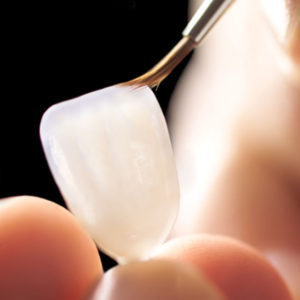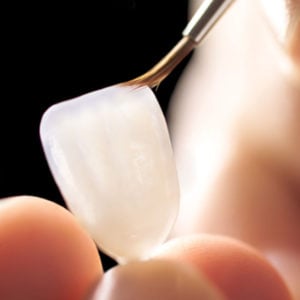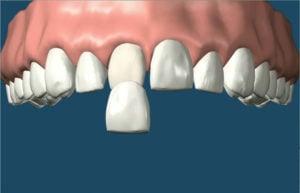
Veneers: Everything You Need to Know
What Are Veneers?
Veneers are thin shells of ceramic (porcelain) that are cemented onto the front of the teeth to enhance the colour and shape of your teeth and enhance your smile.
These veneers are so thin, they may also be termed laminates.
- When the teeth are discoloured or stained, the thin facing of ceramic can greatly enhance the shade and uniformity of the colour.
- When the teeth are worn-out or, poorly shaped, e.g. if they are too narrow with gaps between the teeth, veneers of porcelain can make the teeth look broader and help to close the gaps.

The fabrication of veneers is a highly bespoke service that requires a skilled technician and technologically advanced materials.
At the first visit, your dentist will understand your needs, examine the condition of your teeth, the way you bite and smile and then discuss what can be done.
Depending on the complexity of the case, records will be taken to help construct a prototype or trial set of veneers. These will help you understand the changes that need to be made to achieve your desired results.
In many cases, your dentist may need to shave off a little of the front surface of the tooth to make space for the novel veneer.
Impressions, or moulds, of the teeth will be made for the dental laboratory technician to make the customised veneers out of ceramic.
About a week or two later, the veneers will be placed on the teeth and checked for colour and fit. If satisfactory, the veneers will then be cemented onto the tooth.

Note:
Before veneers can be done your teeth and gums must be in the best of health. That means that accumulations of plaque and calculus must be removed, and any fillings that are faulty must be replaced. In some cases, your teeth may need to be brightened with the use of a whitening gel first to optimize the results of the veneers.
The cost will vary according to material used, the complexity of the case and the skills of your dentist.
Yes.
Tooth coloured filling material called composite resin could be used. These are also easier to repair if it does chip or stain.
Ceramic veneers, on the other hand, give much enhanced colour, translucency and smoothness. Ceramic veneers are also stronger, less likely to chip or accumulate stains.
Crowns cover the entire tooth and are usually done if there is extensive damage to the tooth. Veneers are conservative because very little of the tooth needs to be trimmed.
Just like your natural teeth, veneers too could chip or dislodge.
One would need to be careful not to bite on ice or bones. If cracks or chips occur, then the whole veneer will need to be replaced.
Brush and floss daily to ensure that the margins of the veneer are kept clean. Do not bite on hard foods that may crack the porcelain. Go for regular dental check-ups so that any little defects or problems can be detected and treated quickly.
Veneers are a cosmetic service that can mask several flaws.
With consistent care, veneers can enhance your smile for many years.
.png?width=2223&height=447&name=Background%20(4).png)

-1.svg)



